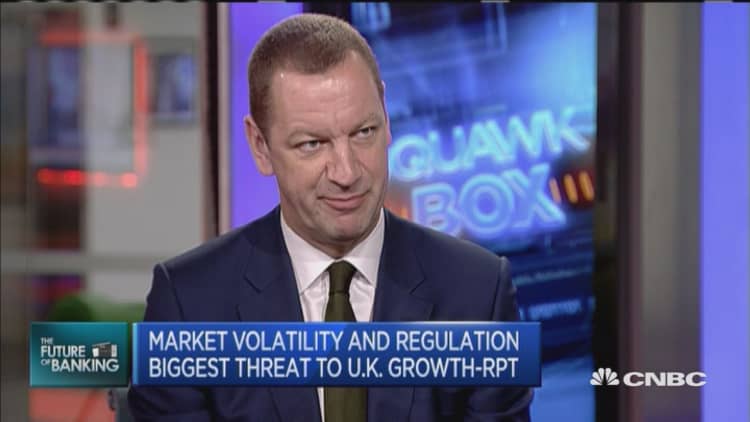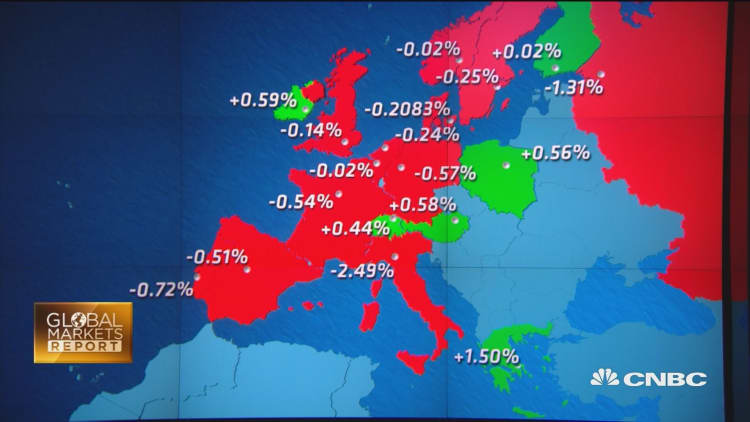
With a month to go until a referendum on the U.K.'s membership of the European Union (EU), analysts at Citi have warned against viewing the result as being "strictly binary" one way or another.
"Our 10-poll average suggests a continued narrow lead for 'Remain'. The campaigns are well underway, but many voters have yet to focus on the referendum," analysts at Citi led by Tina Fordham, managing director and chief global political analyst at Citi, said in a research note on Monday.
Its 10-poll average showed 44.6 percent were in the "Remain" camp versus 41.3 percent backing the "Leave" vote.
Immigration, EU regulations and the cost of the U.K.'s membership of the EU are all key issues in the debate and are sticking points for those that want to leave the bloc. Those in the "Remain" camp point to political and economic instability and uncertainty as the likely fallout should Britons vote overwhelmingly to leave the EU.
Six separate voter polls were published last week and the majority showed that the campaign to keep Britain in the EU was ahead of its rival "Leave" group with about 44 percent of the vote compared to 41 percent and the rest undecided. At the weekend, another poll from market research firm Opinium for the center-left Observer newspaper showed that the "Remain" campaign had extended its lead slightly.
The 'Neverendum' risk
Citi said that the potentially close result suggested by current voter polls suggested that voter turnout was "the most crucial variable" and "the biggest wild card factor in the overall result."
"Given the historically lower turnout for status quo voters and younger voters in the Remain camp, the slight lead for 'Remain' should not be cause for complacency about Brexit risk in our view…It is clear that lower turnout, such as below 50 percent, would favor the more motivated-to-vote Leave camp. Note that there is not a minimum threshold needed for the result to be valid – a simple majority is all that is required," the note published on Monday remarked.
It also said that a close result bore risks that were also "underappreciated" and said that the key to the aftermath of the vote was "the margin of a 'Remain' outcome."
"While in our view 'Remain' is still the most likely outcome, we caution against viewing the referendum result as strictly binary: a 'close Remain' outcome of less than 55 percent would also likely trigger continued political and market volatility, a consequence we think is underappreciated."
"Among the risks are the potential for a very close vote to prompt the resignation of the prime minister, though he has denied this. A constitutional crisis could also emerge in the event that Wales and Scotland vote 'Remain', and England votes to Leave. A close result also leads to 'Neverendum' risk — a second referendum, as took place in Quebec. The Prime Minister has emphasized that there would be no second referendum. In our view, such a promise could only be valid for this Parliament. Dreams of independence have a tendency to endure much longer than that," the note said.
Shock and awe tactics
As well as influential political analyst Tina Fordham and political analysis research associate Tiia Lehto, the note's other authors included respected economists Ebrahim Rahbari, Christian Schulz and Willem Buiter who coined the "Grexit" phrase in 2012 about Greece's then potential departure from the euro zone – which is believed to have inspired the "Brexit" term that has dominated the long-running debate over Britain's place and future in or outside the EU.
In the last month before the debate, the "Remain" campaign is pulling out all the stops to persuade voters to opt for the status quo. On Monday, the Treasury released analysis which it said showed that leaving the EU would tip the U.K. into a year-long recession and lower the country's growth by 3.6 percent after two years.

The analysis, which was launched by Finance Minister George Osborne and Prime Minister David Cameron, who are calling for the U.K. to remain in the political and economic bloc, said that leaving the EU would "would cause an immediate and profound economic shock across the country, creating instability and uncertainty."
It said such uncertainty "would be made worse by the complex negotiations that would follow to agree the terms of Britain's exit from the EU and its new relationship with the rest of Europe."
The latest analysis comes after the Treasury said earlier in the year that a "Brexit" would cost U.K. households £4,300 ($6,238) a year by 2030 and would make the country "permanently poorer."
The vote on whether to stay within the 28-country EU will be held on June 23.



